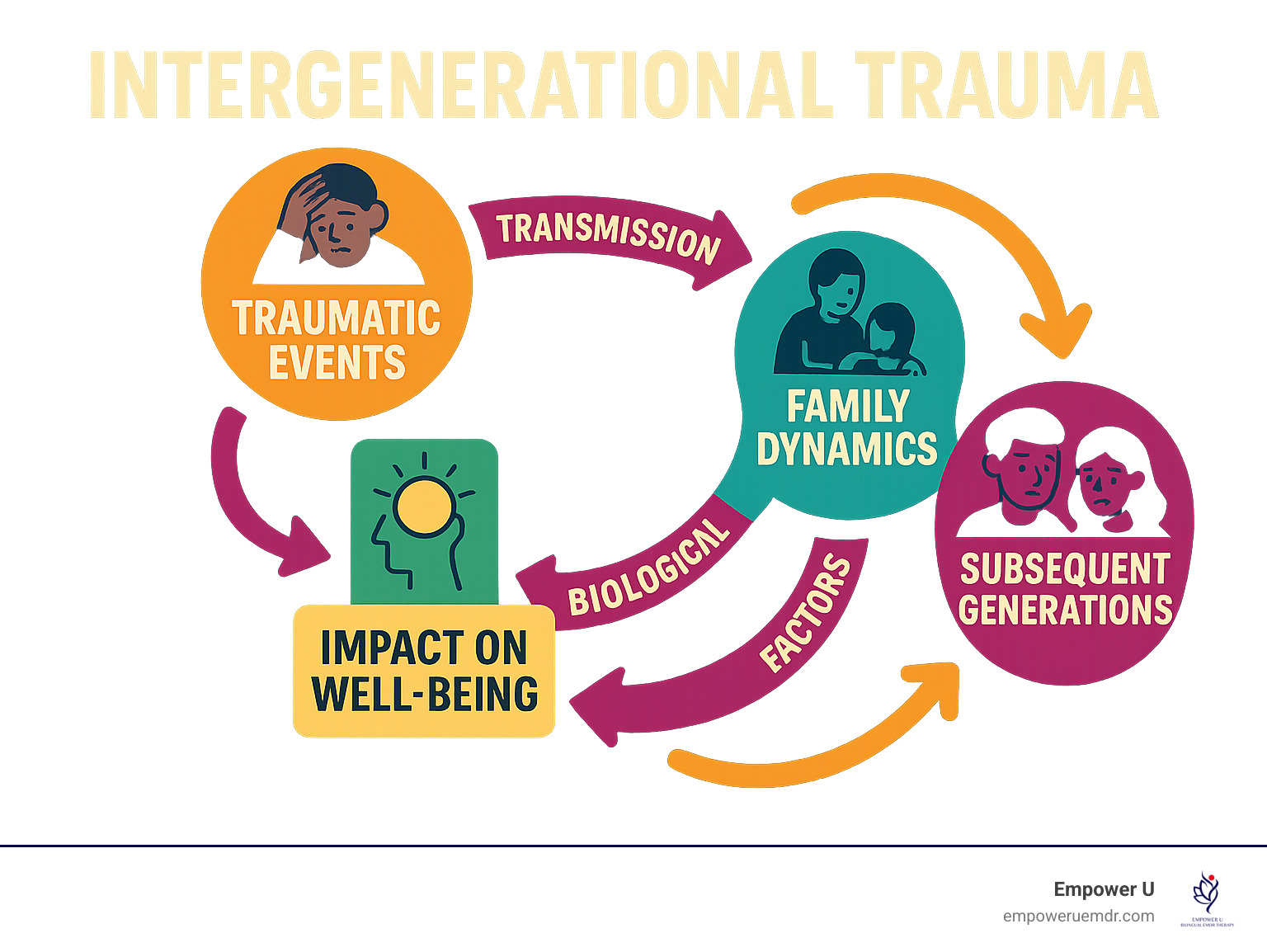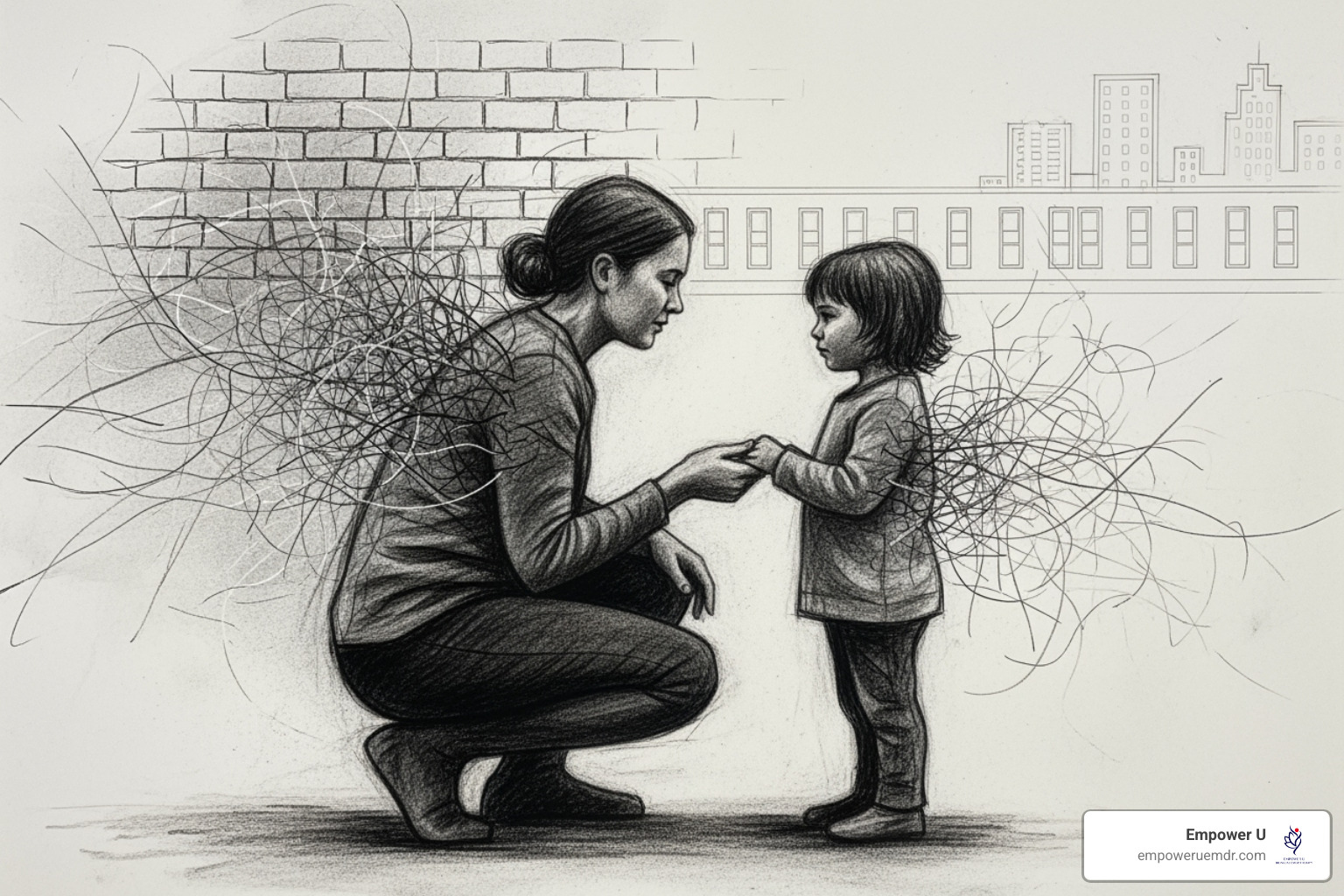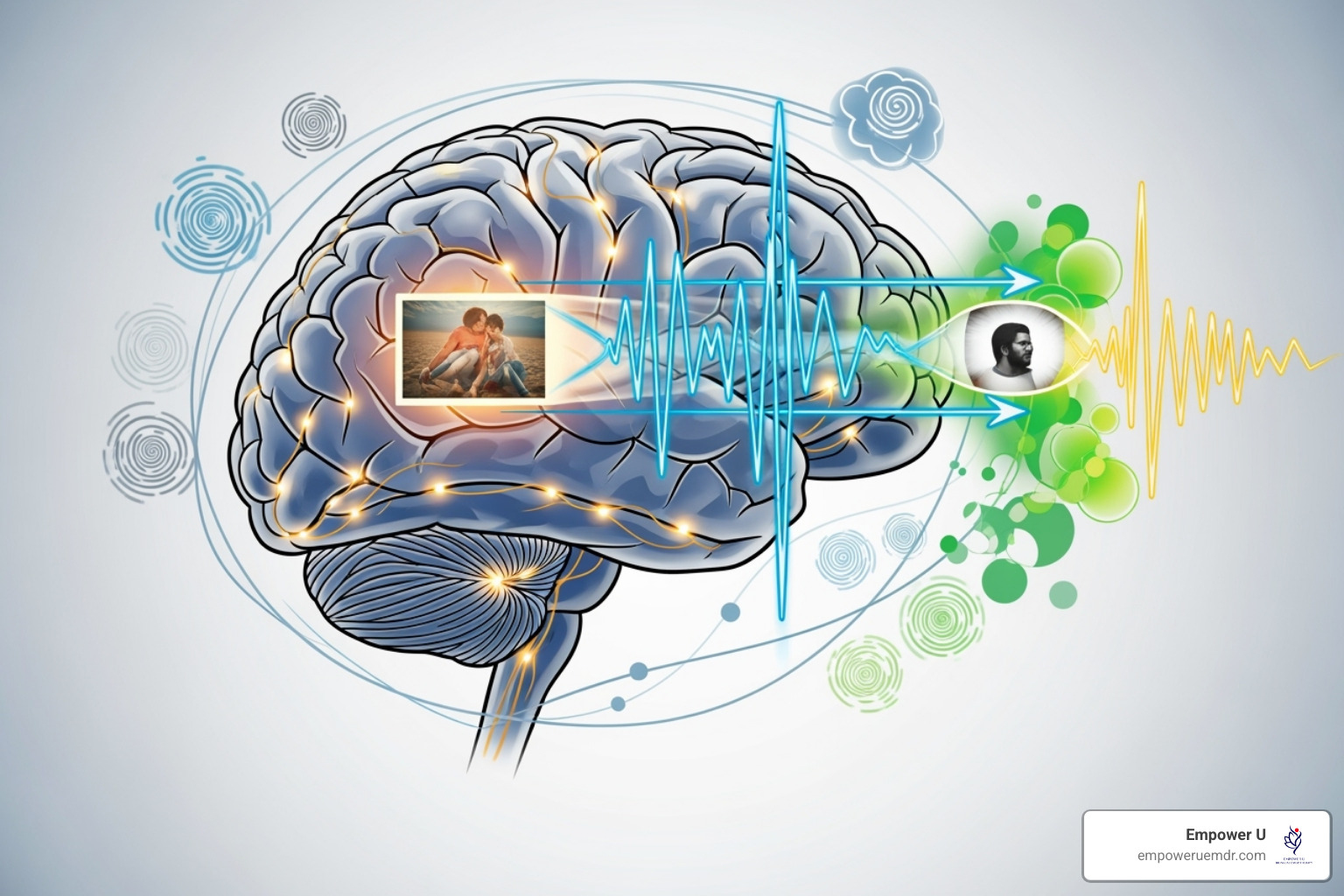Understanding Intergenerational Trauma Therapy: Your Path to Healing Inherited Wounds

Have you ever felt a deep, unexplained sadness or anxiety that seems to echo through your family history? Do you find yourself caught between honoring your family's expectations and living authentically as yourself? If you're an adult child of immigrants or came to this country at a young age, you might be carrying emotional burdens that aren't entirely your own—wounds passed down through generations that continue to shape your daily experience.
As a culturally responsive therapist at Empower U, specializing in immigrant experiences, I understand the unique challenges you face. My approach to intergenerational trauma therapy helps you heal inherited wounds while honoring your cultural heritage, creating space for you to live as your full, authentic self.
What Is Intergenerational Trauma and Generational Trauma?
Intergenerational trauma, also known as transgenerational trauma or generational trauma, describes how emotional and psychological burdens from traumatic experiences pass from one generation to the next. Understanding intergenerational trauma is crucial for recognizing how family history continues to impact your mental health and emotional well being today.
Intergenerational trauma refers to more than inheriting specific memories—it's about the lasting impact of traumatic events and the unresolved emotional wounds that ripple through multiple generations. Mental health professionals recognize that generational trauma affects not just individual family members, but entire families and even entire cultural groups who experienced collective trauma.
For many of my clients navigating bicultural identities, this inherited weight often manifests as emotional distress, anxiety, self-doubt, and guilt when trying to balance family expectations with personal desires. Addressing intergenerational trauma requires understanding how these patterns developed across generations and how they continue to influence family dynamics today.
How Generational Trauma and Intergenerational Trauma Pass Through Families
Understanding the transmission of trauma through families helps us recognize that your struggles make perfect sense given your family's journey. Generational trauma travels through several interconnected pathways that affect multiple family members across subsequent generations:
Early Childhood and Attachment Wounds Parents who experienced trauma may struggle to form secure attachments, unintentionally affecting their children's sense of safety and connection. A parent who survived war, significant trauma, or systemic oppression might remain hypervigilant, always scanning for danger. Children's nervous systems learn by mirroring their caregivers, so they may develop similar sensitivities to threat, even in safe environments. These attachment wounds can create lasting impacts on how we form interpersonal relationships throughout our lives.
Family Communication and Emotional Regulation Many families adopt silence around painful topics or discourage emotional expression as a protective mechanism against further emotional distress. Family members learn unspoken rules like "Don't ask about the past," "Don't show weakness," or "Always put the family first." While these rules often stem from love and a desire to protect the family unit, they can leave you feeling isolated with intense emotions you don't understand, struggling with emotional regulation and healthy coping strategies.
Maladaptive Coping Mechanisms and Strategies You might find yourself unconsciously repeating the maladaptive coping mechanisms your ancestors used for survival—perfectionism, emotional withdrawal, people-pleasing, or an inability to rest. These maladaptive coping strategies served your family well during times of crisis, but may now create internal conflict as you strive for a security that always feels just out of reach. Recognizing these inherited coping mechanisms is essential for developing healthier alternatives.
Historical Trauma and Cultural Context For immigrants from collectivistic cultures, intergenerational trauma often intertwines with historical trauma—the ongoing stress of navigating between worlds. Collective trauma from war, displacement, systemic oppression, or poverty creates lasting impacts that affect how families relate to safety, trust, and belonging across generations. This type of generational trauma requires specialized understanding of how cultural groups process and heal from shared traumatic experiences.

The Science Behind Inherited Wounds and Complex Trauma
Modern research, particularly in epigenetics, reveals the biological foundations of intergenerational trauma and how complex trauma affects multiple generations. Epigenetics studies how our environment and experiences can influence gene expression without changing the DNA code itself, providing scientific evidence for how generational trauma impacts physical well being alongside mental health.
Groundbreaking research by Holocaust survivors' descendants and other studies found that children showed changes in gene expression related to stress response, particularly affecting how the nervous system processes traumatic experiences. Genetic factors play a role in how intergenerational trauma manifests, but these changes aren't permanent—they're adaptable responses that can be modified through therapeutic interventions and healing processes.
This research demonstrates that intergenerational trauma families often carry biological markers that influence how future generations react to stress and process emotions. However, the same mechanisms that transmit generational trauma can also transmit healing and resilience, making your journey toward wellness a gift not only to yourself but to subsequent generations.
Recognizing Intergenerational Trauma and Generational Trauma in Your Life
As someone who understands the immigrant experience personally, I know how difficult it can be to separate your own emotions from those that might be inherited through family history. Recognizing these patterns of generational trauma isn't about blame—it's about understanding how intergenerational trauma has shaped your family dynamics, and understanding brings the power to create positive change.
Common Signs and Mental Health Challenges
Emotional Distress and Mental Health Symptoms
- Persistent anxiety or depression that seems disproportionate to your current circumstances
- Hypervigilance or a constant feeling of being on alert, even in safe situations
- Emotional numbness or feeling disconnected from your own emotions
- Unexplained sadness, fear, or anger that doesn't seem tied to your own experiences
- Difficulty with emotional regulation, especially during times of stress
Identity and Self-Worth Issues
- Feeling torn between two worlds and belonging fully to neither
- Deep-seated beliefs that you're somehow flawed or not good enough
- Imposter syndrome, especially when achieving success
- Guilt when your choices differ from family expectations
- Shame around your cultural identity or family background
- Struggles with other mental health conditions that seem connected to family patterns
Relational Patterns and Family Functioning
- Difficulty with trust and intimacy in interpersonal relationships
- Tendency to repeat unhealthy relationship dynamics seen in your own families
- People-pleasing at your own expense, affecting family cohesion
- Feeling fundamentally different or unable to truly connect with family members
- Challenges maintaining healthy relationships while honoring cultural values
Behavioral Cycles and Coping Strategies
- Perfectionism or an inability to rest, impacting physical well being
- Scarcity mindset around money, love, or opportunities
- Workaholic tendencies or difficulty setting boundaries with multiple family members
- Repeating communication patterns that affect entire family dynamics
- Using the same coping mechanisms you observed in previous generations
Questions for Self-Reflection on Generational Trauma
Take a moment to gently explore these questions about intergenerational trauma in your life:
- Do you feel an overwhelming sense of responsibility for your family's happiness or emotional well being?
- Do you experience guilt or fear when disappointing your family, even when making healthy choices for yourself?
- Do you struggle with chronic stress or anxiety that affects your physical well being, even when your life appears stable?
- Do you feel stuck in certain patterns despite your best efforts at overcoming generational trauma?
- Do you have persistent feelings that something bad is about to happen, even during good times?
- Do you notice similarities between your emotional responses and those of other family members across generations?
If these questions resonate, exploring your experiences within the context of intergenerational trauma and your family's journey could support significant emotional healing.

How Intergenerational Trauma Therapy Can Transform Your Life
My approach to healing intergenerational trauma acknowledges that recovery happens within the context of your cultural identity and family relationships. I don't see you as broken—I see you as someone carrying patterns of generational trauma that can be understood, honored, and transformed through specialized therapeutic interventions.
EMDR Therapy for Inherited Wounds and Complex Trauma
Eye Movement Desensitization and Reprocessing (EMDR) therapy is one of the most powerful tools I use for addressing intergenerational trauma and complex trauma. EMDR works with your brain's natural healing process to help resolve stuck emotional information, even when you didn't directly experience the original traumatic event.
You might carry your ancestors' emotional wounds—persistent feelings of danger when you're safe, or deep shame that isn't connected to your own actions. Through EMDR therapy, we identify present-day triggers that hold these inherited burdens from generational trauma and help your nervous system distinguish between past threats and present safety.
The healing process doesn't erase your family history or cultural heritage. Instead, EMDR helps reduce the emotional charge of inherited wounds, allowing new, more adaptive perspectives to emerge. Beliefs like "I'm not safe" or "I'm a burden" can transform into "I can handle what comes my way" or "I deserve love and belonging." This approach to healing intergenerational trauma creates lasting change that benefits not just you, but future generations.
A Comprehensive Approach to Healing Generational Trauma
While EMDR forms the foundation of my work with intergenerational trauma, I integrate several therapeutic approaches to create a personalized healing journey:
Internal Family Systems (IFS) Therapy for Family Dynamics We explore the different parts of you that carry inherited burdens from generational trauma, understanding how your "protector" parts developed to keep you safe from intergenerational fears. This compassionate approach helps you recognize that perfectionism or people-pleasing aren't character flaws—they're survival strategies developed in response to family history that can now be gently updated.
Narrative Therapy for Rewriting Your Story I help you separate yourself from problem stories related to intergenerational trauma and reconnect with your strengths, values, and moments of resilience. Through this process, you can rewrite your story from a place of empowerment rather than limitation, honoring your family history while creating your own path forward.
Cognitive Behavioral Therapy (CBT) and Dialectical Behavior Therapy (DBT) These approaches provide practical coping strategies for identifying and challenging inherited thought patterns while building emotional regulation, distress tolerance, and effective communication skills—especially valuable when navigating complex family dynamics affected by generational trauma.
Family Therapy Principles for Understanding Family Systems While I work primarily with individuals, I incorporate family therapy principles to help you understand how generational trauma has shaped your entire family system. This understanding can improve your relationships with multiple family members and support healthier family functioning overall.
Cultural Sensitivity in Healing Intergenerational Trauma
As a bicultural immigrant myself, I deeply understand the complexity of navigating between your heritage culture and mainstream American society. My lived experience as someone who switched from engineering to therapy as part of my own journey of reconnecting with myself helps me create a safe, culturally sensitive space where you feel truly seen and understood.
Understanding Collectivistic Values and Cultural Groups
I recognize that many of my clients come from collectivistic cultural groups where family honor, intergenerational responsibility, and community connections are central values. Healing intergenerational trauma doesn't mean abandoning these important aspects of your identity—it means finding ways to honor your heritage while also honoring your individual needs and authentic self.
Working with Diverse Cultural Groups Affected by Intergenerational Trauma
My practice welcomes immigrants from various collectivistic cultures, including Latino, Asian, Middle Eastern, North African, Russian, and other communities affected by generational trauma. While each culture has its unique characteristics, there are universal experiences in addressing intergenerational trauma—navigating between worlds, managing family expectations alongside personal desires, and forming identity in a new cultural context.
I offer bilingual therapy in Spanish and understand the unique mental health challenges faced by immigrants from collectivistic cultures. This linguistic accessibility is one aspect of my culturally responsive approach, which also includes understanding the impact of historical trauma, discrimination, and the ongoing stress of cultural navigation on mental health and emotional well being.
Addressing Collective Trauma and Historical Wounds
For many clients, intergenerational trauma intertwines with experiences of collective trauma, racism, discrimination, and systemic oppression. My approach acknowledges these realities and addresses how they compound inherited wounds across multiple generations. We work together to:
- Validate your experiences of discrimination and cultural stress that affect mental health
- Process the impact of historical trauma and systemic oppression using trauma-informed therapeutic interventions
- Navigate the internal conflict between individual growth and collective family values
- Honor the strengths and resilience from your cultural heritage as resources for healing intergenerational trauma
- Create strategies for maintaining cultural connections while establishing healthy boundaries that support emotional healing
The Healing Journey: What to Expect in Intergenerational Trauma Therapy
Healing intergenerational trauma is a deeply personal process that honors both your individual needs and cultural context. Here's what you can expect when working with me to address generational trauma:
Understanding Your Story in Context
We begin by exploring your experiences within the larger framework of your family's journey and cultural background. I listen with deep curiosity and care, helping you understand how your current struggles connect to broader patterns of intergenerational trauma while validating the very real impact they have on your mental health and daily life.
Building Safety and Emotional Regulation
Before diving deep into trauma work, we focus on creating emotional safety and building practical coping strategies for managing the effects of generational trauma. This might include learning emotional regulation techniques, grounding strategies, and ways to manage anxiety and emotional distress in daily life while maintaining your physical well being.
Processing Inherited Wounds and Unresolved Trauma
Using EMDR and other trauma-informed therapeutic interventions, we carefully process the emotional burdens and unresolved trauma you've inherited. This work helps your nervous system distinguish between past and present, reducing the power of triggered responses and creating space for new, healthier patterns that break cycles of generational trauma.
Integrating New Perspectives and Foster Resilience
As we work together on healing intergenerational trauma, you'll develop a stronger sense of your authentic self, separate from inherited roles and expectations. This doesn't mean rejecting your culture or family—it means engaging with your heritage from a place of choice rather than obligation, which can actually strengthen family relationships and improve overall family functioning.
Building Your New Legacy
The ultimate goal of intergenerational trauma therapy is helping you create a life aligned with your values and authentic self while maintaining meaningful connections to your cultural roots. You'll develop the skills to break unhealthy cycles of generational trauma while preserving the wisdom and strengths from your heritage, creating a healthier legacy for your own children and future generations.

The Profound Benefits of Healing Generational Trauma
When you release burdens that were never yours to carry, transformation ripples through every area of your life and can positively impact your entire family:
Mental Health and Emotional Freedom
- Reduced anxiety and chronic worry as your nervous system learns to feel safe
- Stronger self-esteem and confidence rooted in authentic self-worth
- Decreased shame and guilt around your cultural identity and family relationships
- Greater emotional resilience and ability to navigate life's challenges
- Improved emotional regulation and overall mental health
Relationship Transformation and Family Cohesion
- Healthier boundaries based on respect rather than fear or obligation
- Improved communication skills for navigating complex family dynamics affected by generational trauma
- More authentic connections with family members built on genuine intimacy rather than people-pleasing
- Ability to maintain cultural connections while honoring your individual needs
- Stronger interpersonal relationships both within and outside your family unit
Personal Empowerment and Emotional Health
- Clearer sense of your values, separate from inherited expectations
- Confidence to make choices aligned with your authentic self
- Improved ability to handle cultural conflicts and family pressure
- Stronger connection to both your heritage and your individual identity
- Enhanced emotional health and physical well being
Breaking Cycles for Future Generations
- Interrupting the transmission of intergenerational trauma for your own children
- Modeling healthy emotional regulation and authentic living for family members
- Creating new family patterns based on understanding and respect
- Transforming a legacy of survival into one of thriving and resilience
- Contributing to the healing of collective trauma within your cultural community
Is Intergenerational Trauma Therapy Right for You?
You might benefit from this specialized approach to healing generational trauma if you:
- Feel caught between honoring your family and living authentically
- Experience anxiety, depression, or emotional distress that seems connected to family patterns
- Struggle with perfectionism, people-pleasing, or difficulty setting boundaries with family members
- Have difficulty trusting your own judgment or feel like an imposter
- Want to maintain cultural connections while creating healthier family dynamics
- Feel ready to understand your mental health challenges within the larger context of intergenerational trauma and create positive change
- Notice patterns of unresolved trauma or unresolved grief affecting multiple generations in your family
- Desire to break cycles of generational trauma for your own children and future generations
Remember, seeking therapy for intergenerational trauma isn't about blaming your family or rejecting your culture. It's about understanding the full story of your experiences and creating space for emotional healing that honors both your heritage and your individual journey toward better mental health and emotional well being.
Specialized Services for Addressing Intergenerational Trauma
My approach to healing generational trauma incorporates several evidence-based therapeutic interventions designed specifically for working with inherited wounds and complex trauma:
EMDR Therapy for Intergenerational Trauma Eye Movement Desensitization and Reprocessing therapy helps process traumatic experiences that may have been passed down through generations, even when you didn't directly experience the original traumatic event.
Bilingual EMDR Therapy For clients who are more comfortable processing emotions in their native language, I offer EMDR therapy in Spanish, recognizing that healing intergenerational trauma often requires accessing emotions and memories in the language where they were first formed.
Trauma Therapy for Complex Trauma My approach addresses the complexity of intergenerational trauma, recognizing that healing requires understanding how traumatic experiences have affected your family system across multiple generations.
Anxiety and Depression Therapy I help clients understand how their anxiety and depression may be connected to generational trauma, providing specialized treatment that addresses both current symptoms and their historical roots.
Culturally Responsive Therapy for Immigrants My services are specifically designed for immigrants and adult children of immigrants, recognizing the unique mental health challenges faced by those navigating between cultures while healing from intergenerational trauma.

Taking the First Step Toward Healing Intergenerational Trauma
Healing generational trauma is profound work that allows you to honor your family's journey while freeing yourself to write your own story. You don't have to carry the weight of intergenerational trauma alone, and seeking support from mental health professionals who understand your cultural context can make all the difference in your healing process.
As someone who personally understands the complexity of navigating between cultures and the journey of reconnecting with authentic self, I'm passionate about helping adult children of immigrants and young immigrants find peace, confidence, and empowerment. My approach to addressing intergenerational trauma doesn't see you as broken—instead, I help you make sense of your struggles by looking at the bigger picture of your life and cultural context.
Through specialized therapeutic interventions designed for healing generational trauma, we can work together to:
- Process unresolved trauma and emotional wounds that have affected multiple generations
- Develop healthy coping strategies to replace maladaptive coping mechanisms
- Improve family dynamics and relationships with family members
- Foster resilience and emotional regulation skills
- Create lasting change that benefits future generations
If you're ready to explore your story within the larger context of intergenerational trauma and begin your healing journey, I invite you to reach out. Together, we can work to transform inherited patterns of pain into a legacy of resilience, understanding, and authentic connection.
Your healing journey from generational trauma matters—not just for you, but for the generations that come after you. Let's take the first step together toward creating the life you truly deserve, one where you feel empowered to live as your full, authentic self while honoring the rich heritage that shapes your story.
Contact me today to learn more about how intergenerational trauma therapy can support your journey toward healing and authentic living in Irvine, CA. Through compassionate, culturally responsive care, we can address the roots of generational trauma and create lasting change for you and future generations.

